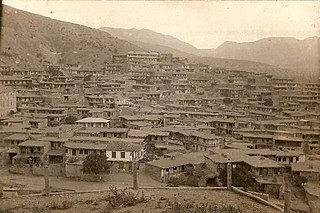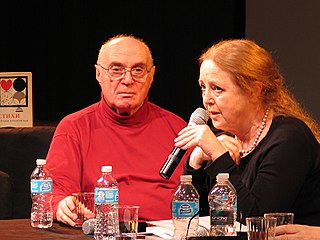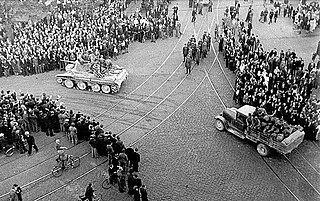
The Gulag was a system of forced labor camps in the Soviet Union. The word Gulag originally referred only to the division of the Soviet secret police that was in charge of running the forced labor camps from the 1930s to the early 1950s during Joseph Stalin's rule, but in English literature the term is popularly used for the system of forced labor throughout the Soviet era. The abbreviation GULAG (ГУЛАГ) stands for "Гла́вное Управле́ние исправи́тельно-трудовы́х ЛАГере́й", but the full official name of the agency changed several times.

Samizdat was a form of dissident activity across the Eastern Bloc in which individuals reproduced censored and underground makeshift publications, often by hand, and passed the documents from reader to reader. The practice of manual reproduction was widespread, because typewriters and printing devices required official registration and permission to access. This was a grassroots practice used to evade official Soviet censorship.

During the later stages of World War II and the post-war period, Germans and Volksdeutsche fled and were expelled from various Eastern and Central European countries, including Czechoslovakia, and from the former German provinces of Lower and Upper Silesia, East Prussia, and the eastern parts of Brandenburg (Neumark) and Pomerania (Hinterpommern), which were annexed by Poland and the Soviet Union.

From 1930 to 1952, the government of the Soviet Union, on the orders of Soviet leader Joseph Stalin and under the direction of the NKVD official Lavrentiy Beria, forcibly transferred populations of various groups. These actions may be classified into the following broad categories: deportations of "anti-Soviet" categories of population, deportations of entire nationalities, labor force transfer, and organized migrations in opposite directions to fill ethnically cleansed territories. Dekulakization marked the first time that an entire class was deported, whereas the deportation of Soviet Koreans in 1937 marked the precedent of a specific ethnic deportation of an entire nationality.

Special settlements in the Soviet Union were the result of population transfers and were performed in a series of operations organized according to social class or nationality of the deported. Resettling of "enemy classes" such as prosperous peasants and entire populations by ethnicity was a method of political repression in the Soviet Union, although separate from the Gulag system of penal labor. Involuntary settlement played a role in the colonization of virgin lands of the Soviet Union. This role was specifically mentioned in the first Soviet decrees about involuntary labor camps. Compared to the Gulag labor camps, the involuntary settlements had the appearance of "normal" settlements: people lived in families, and there was slightly more freedom of movement; however, that was permitted only within a small specified area. All settlers were overseen by the NKVD; once a month a person had to register at a local law enforcement office at a selsoviet in rural areas or at a militsiya department in urban settlements. As second-class citizens, deported peoples designated as "special settlers" were prohibited from holding a variety of jobs, returning to their region of origin, attending prestigious schools, and even joining the cosmonaut program. Due to this special settlements have been called by J. Otto Pohl a type of apartheid.
Throughout the history of the Soviet Union, tens of millions of people suffered political repression, which was an instrument of the state since the October Revolution. It culminated during the Stalin era, then declined, but it continued to exist during the "Khrushchev Thaw", followed by increased persecution of Soviet dissidents during the Brezhnev era, and it did not cease to exist until late in Mikhail Gorbachev's rule when it was ended in keeping with his policies of glasnost and perestroika.
Order 7161 is the top secret USSR State Defense Committee Order no 7161ss of December 16, 1944 about mobilisation and internment of able-bodied Germans for reparation works in the USSR. It was part of the organisation of forced labor of Germans in the Soviet Union since the ending period of World War II.

Forced labor of Germans in the Soviet Union was considered by the Soviet Union to be part of German war reparations for the damage inflicted by Nazi Germany on the Soviet Union during the Axis-Soviet campaigns (1941–1945) of World War II. Soviet authorities deported German civilians from Germany and Eastern Europe to the USSR after World War II as forced laborers, while ethnic Germans living in the USSR were deported during World War II and conscripted for forced labor. German prisoners of war were also used as a source of forced labor during and after the war by the Soviet Union and by the Western Allies.

Pavel Mikhailovich Litvinov is a Russian-born U.S. physicist, writer, teacher, human rights activist and former Soviet-era dissident.

Author and publisher Valery Nikolaevich Chalidze was a Soviet dissident and human rights activist, deprived of his USSR citizenship in 1972 while on a visit to the US.

The Polish population transfers in 1944–1946 from the eastern half of prewar Poland, were the forced migrations of Poles toward the end and in the aftermath of World War II. These were the result of a Soviet Union policy that had been ratified by the main Allies of World War II. Similarly, the Soviet Union had enforced policies between 1939 and 1941 which targeted and expelled ethnic Poles residing in the Soviet zone of occupation following the Nazi-Soviet invasion of Poland. The second wave of expulsions resulted from the retaking of Poland from the Wehrmacht by the Red Army. The USSR took over territory for its western republics.

Pavel Markovich Polian, pseudonym: Pavel Nerler, is a Russian geographer and historian, and Doctor of Geographical Sciences with the Institute of Geography (1998) of the Russian Academy of Sciences. He authored over 300 publications and is most known for his research on the history and geography of forced migrations.
Operation North was the code name which was assigned by the USSR Ministry of State Security to the massive deportation of Jehovah's Witnesses and their families to Siberia in the Soviet Union on 1 and 8 April 1951.

The Soviet occupation of the Baltic states covers the period from the Soviet–Baltic mutual assistance pacts in 1939, to their invasion and annexation in 1940, to the mass deportations of 1941.

Arseny Borisovich Roginsky was a Soviet dissident and Russian historian. He was one of the founders of the International Historical and Civil Rights Society Memorial, and its head since 1998.
The border area is the area immediately adjacent to the border of a country. In addition to the informal definition, a border area may have a legal definition and delineation, both domestically and due to bilateral agreements. Reasons for legal definition of a border area include enhanced security and special provisions for the residents of border areas to cross the border.
In 1965 a human rights movement emerged in the USSR. Those actively involved did not share a single set of beliefs. Many wanted a variety of civil rights — freedom of expression, of religious belief, of national self-determination. To some it was crucial to provide a truthful record of what was happening in the country, not the heavily censored version provided in official media outlets. Others still were "reform Communists" who thought it possible to change the Soviet system for the better.
The Trial of the Four, also Galanskov–Ginzburg trial, was the 1968 trial of Yuri Galanskov, Alexander Ginzburg, Alexey Dobrovolsky and Vera Lahkova for their involvement in samizdat publications. The trial took place in Moscow City Court on January 8–12. All four defendants were sentenced to terms in labour camps. The trial played a major part in consolidating the emerging human rights movement in the Soviet Union.

The deportation of the Meskhetian Turks was the forced transfer by the Soviet government of the entire Meskhetian Turk population from the Meskheti region of the Georgian Soviet Socialist Republic to Central Asia on 14 November 1944. During the deportation, between 92,307 and 94,955 Meskhetian Turks were forcibly removed from 212 villages. They were packed into cattle wagons and mostly sent to the Uzbek Soviet Socialist Republic. Members of other ethnic groups were also deported during the operation, including Kurds and Hemshins, bringing the total to approximately 115,000 evicted people. They were placed in special settlements where they were assigned to forced labor. The deportation and harsh conditions in exile caused between 12,589 to 50,000 deaths.

The de-Tatarization of Crimea refers to the Soviet and Russian efforts to remove traces of the indigenous Crimean Tatar presence from the peninsula. De-Tatarization has been manifested in various ways throughout history, ranging from the full-scale deportation and exile of Crimean Tatars in 1944 to other measures such as the burning of Crimean Tatar books published in the 1920s and toponym renaming.














